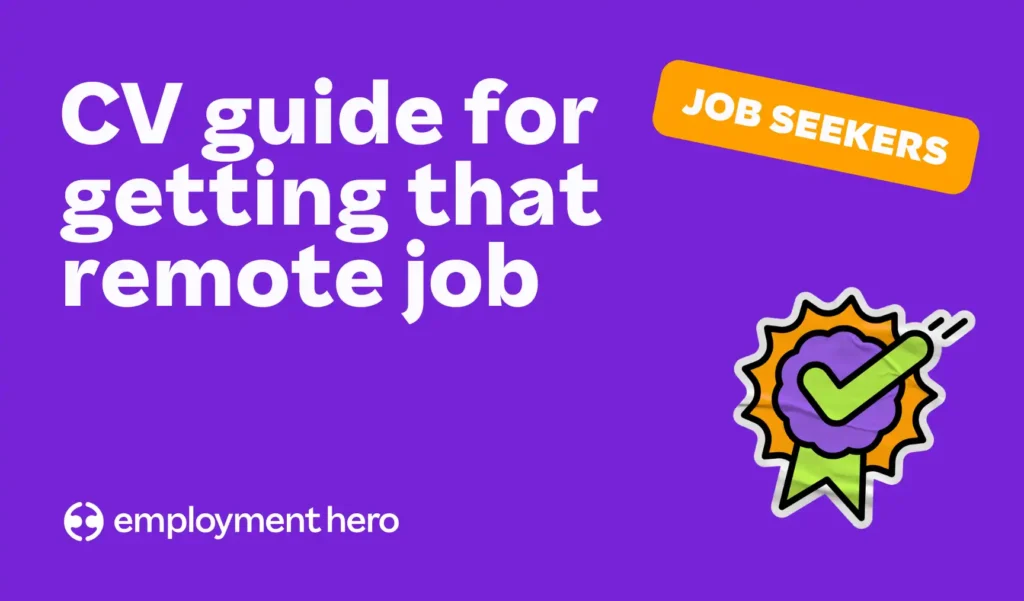How to write a CV in New Zealand for remote jobs

Contents
Securing a remote role demands a strong CV. Beyond mere qualifications, they’re searching for evidence of your capacity to work well independently, and often, with little supervision. This guide is your compass to crafting a compelling CV, uniquely designed to help you secure your ideal remote job.
Is the role really remote?
Before you spend time making your CV perfect, make sure the job is truly remote and offers the flexibility you want. “Remote” can mean different things to different companies, and not all “remote” jobs are fully flexible.
Some remote jobs might still ask you to come into the office sometimes for meetings, training, or big project goals. Others might be “hybrid,” meaning you work some days remotely and some days in the office. Also, companies might only hire remote workers from certain countries, states or time zones.
To avoid being disappointed and wasting your effort, carefully read the job description for details about where you’ll work, if you need to travel, and any rules about your work location. If it’s not clear, ask questions when you apply or during an initial call. This way, you’ll know if what you expect from remote work matches what the company offers.
Tips to recognise true remote roles:
- Look for terms like “remote-first” or “work from anywhere.”
- Check if there are location requirements, such as “must be based in New Zealand.”
- Review company policies on flexibility to avoid confusion about hybrid roles.
Being able to identify these terms ensures you’re applying for positions that align with your remote work expectations.
Tailor your CV to the role and employer
For remote roles, your CV must show strong alignment with the role’s requirements and the company’s values.
Steps to customise your CV:
- Match skills and experience to the job ad: Highlight key responsibilities and skills mentioned in the job description.
- Reflect the values of the business: Research the company and include themes or experiences that resonate with their mission and company values. For example, if collaboration is a key focus, mention your teamwork capabilities.
- Optimise for Applicant Tracking Systems: Use targeted keywords that appear in the job description to ensure your CV makes it through automated screening filters.
Example of customising your CV:
Job ad requirement: “Experience using project management software like Trello.”
CV example: “Coordinated cross-region projects using Trello, improving task completion rates by 30%.”
Structure your CV for success
A well-structured CV increases readability and ensures key assets like skills and achievements are noticed.
Must-have CV sections:
- Contact details: Your name, mobile number, email address, and location (adding your time zone can help for remote jobs).
- Professional summary: A concise overview of your qualifications and why you’re perfect for remote work.
- Key skills: Include soft skills like communication and time management, as well as technical expertise.
- Work experience: Highlight remote or hybrid roles if applicable. Focus on measurable results rather than tasks.
- Remote-readiness tools: List relevant software like Slack, Zoom, and Google Workspace to demonstrate tech-savviness.
- Online portfolios: Include links to LinkedIn, personal websites, or other work samples.
Layout tips for remote-friendly CVs
When creating your CV, it’s important to make it easy to read and understand. Choose simple, clean fonts and aim to keep your CV to a maximum of one to two pages. Use bold headings to clearly label each section, which helps guide the reader through your information. This neat and organised approach makes it easier for recruiters to quickly find the key details they need.
Showcase remote work skills
Remote roles require specific skills that prove you can succeed without direct supervision. These should be highlighted prominently in your CV.
Top skills for remote roles:
- Time management: Effectively balancing work hours, deadlines, and personal commitments.
- Self-motivation: Showing initiative and focus without the need for close monitoring.
- Communication: Strong written and verbal abilities for asynchronous collaboration.
- Problem-solving: Quickly addressing challenges independently.
- Technological proficiency: Familiarity with platforms like Slack, Trello, and Zoom.
Avoid common CV errors
Avoiding these errors can make or break your application. Here’s what to watch out for when fine-tuning your CV:
- Fluff over facts: Replace generic phrases like “hard worker” with tangible results. For example, “In X role, I improved process efficiency by 25%.”
- Poor formatting: Keep it clean and consistent to maintain professional appeal.
- Excluding remote work proof: Underscore your remote skills and experience to show readiness.
Add links to portfolios and online work examples
Modern CVs include digital links to provide remote employers with more insight into your background.
What to Include:
- A fully optimised and professional LinkedIn profile.
- Work samples that demonstrate suitable expertise.
- If relevant, a website portfolio showcasing your skills or past achievements.
Where to place links:
Include a section for “Additional Information” or “Professional Links” towards the end of your CV where you can add your links. Make sure all these links are clickable when you submit your CV digitally.
Changing careers? Adapt your CV to suit
Shifting from an on-site role to a remote one is a significant change, but your CV can reflect this transition effectively.
Tips for career changers:
- Focus on transferable skills: Communication, organisation, and problem-solving are just as relevant in remote work.
- Reframe gaps positively: Highlight any remote or digital tasks you’ve handled, even if they were a smaller part of your responsibilities.
Example: “Designed online training resources that supported a team of 15 employees during the company’s pivot to a hybrid model.”
Your remote work CV checklist
Before you hit send on that application, review your CV to ensure it’s optimised for remote roles:
- Contact details and time zone are listed.
- Professional summary highlights remote skills and experience.
- Keywords from the job description are seamlessly included.
- Measurable achievements are prioritised.
- Relevant links and portfolios are attached.
- General formatting and grammar have been thoroughly checked.
Ready to land your dream remote job?
Your CV is your ticket to an exciting remote career. By tailoring your CV for remote roles, showcasing the right skills and avoiding common mistakes, you’ll set yourself up for success. Now’s the time to act. Polish your CV, land an interview and prepare for a day-one-ready start to your new remote job. Unlock your full potential and start your job search with Employment Hero Jobs today.





















